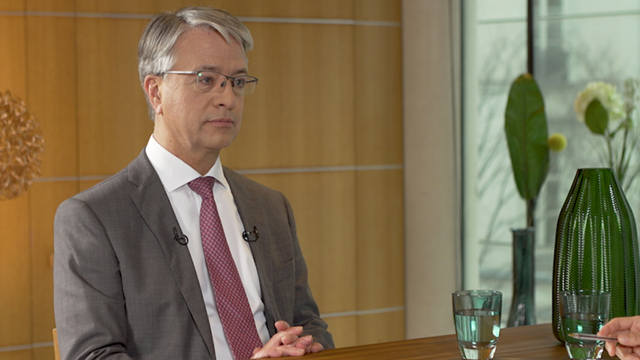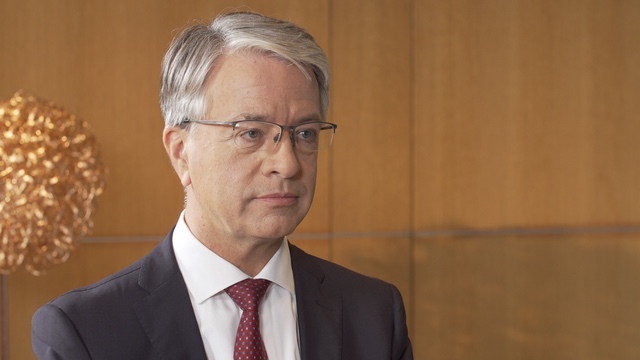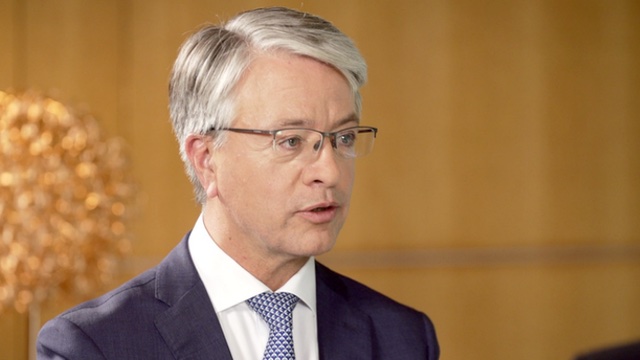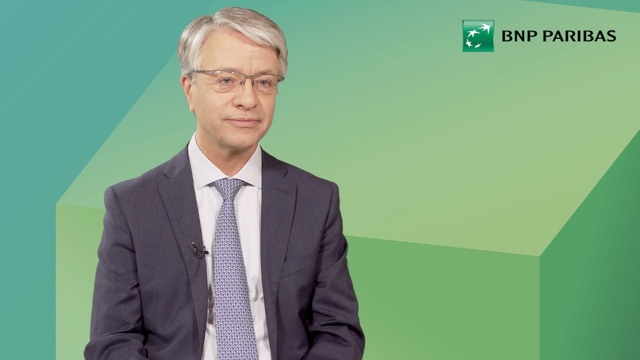EuroBusiness Media (EBM): BNP Paribas, one of Europe’s largest banks reports results for the second quarter of 2011, Baudouin Prot welcome! You are the CEO of BNP Paribas, what are your comments on the Group's performance in the second quarter?
Baudouin Prot: In the second quarter, characterised by a challenging environment, BNP Paribas posted a net income Group share of 2.1 billion euros, comparable to the second quarter of 2010, despite the impact of 534 million euros of provisions due to the new Greek assistance program. This very good performance once again illustrates BNP Paribas’ strong profit-generation capacity thanks to the resilience and the effectiveness of the Group’s business model.
Revenues of the operating divisions increased 3.4% from a year ago, driven by sustained volume growth in our 4 domestic networks, namely France, Italy, Belgium and Luxembourg, as a result of low levels of household debt combined with high savings rates in these countries.
Thanks to well contained operating expenses, up 2.3% excluding the charge related to systemic taxes, gross operating income grew 3.7%. As a result of a continued decline in cost of risk, across all divisions, pre-tax income of all operating divisions was up 14.4% compared to the second quarter of 2010.
Solvency remains high. The Group’s common equity Tier 1 ratio stood at 9.6% at the end of June 2011, up 10 basis points over the quarter and 120 basis points over 1 year.
Book value per share was up 7.2% from a year ago to 56.7 euros, and earnings per share was up 7.3% to 3.8 euros.
Hence, the annualised Return on Equity in the first half reached 13.8% against 13.7% in the first half of 2010, a level of profitability that is amongst the highest in the industry.
EBM: How do Q2 provisions compare to Q1, and what is your provisions outlook for the rest of the year?
Baudouin Prot: At Group level, the cost of risk in the second quarter was up 25% compared to last year due to the one-off impairment related to Greek sovereign exposure.
Excluding these exceptional provisions, the cost of risk continued to demonstrate a declining trend of -25%. As a percentage of customer loans and excluding the Greek impairment, it stood at 48 basis points, against 66 basis points a year earlier and 54 basis points in the first quarter.
These figures confirm the continuing improvement in asset quality across the board, notably for Personal Finance, even though the reduction trend differs from one market to another. French and BeLux Retail Banking continued to experience low levels of provisions during the second quarter, whilst BNL bc also showed a slight improvement in trend this quarter. As for Europe Mediterranean, provisions have decreased in all geographic areas.
We expect this trend to continue in the second part of the year.
EBM: As the yields on government bonds increase because of the ongoing sovereign debt crisis, what is the impact on your funding costs? With the current levels of stress in the money markets, are you at all concerned that the Greek situation may lead to a Lehman-like freeze-up of bank funding?
Baudouin Prot: Increasing yields on sovereign debts do not necessarily imply higher funding costs for BNP Paribas. If anything, in such circumstances, BNP Paribas benefits from a flight-to-quality effect increasing its competitive edge in terms of funding.
On the short term, BNP Paribas has been consistently extending its average funding maturity since 2009. Our 3-month funding cost remains below Libor in all currencies. On maturities below 1 month, BNP Paribas is currently long cash in USD, placing significant cash excesses with the Fed.
As regards long term funding, we have already achieved 100% of our yearly funding program of 35 billion euros, out of which 20 billion US dollars and the average debt maturity is now extended to 6 years.
Our ability to diversify funding sources meant that, even in turbulent times, we have been able to raise funds through covered bonds and private placements.
In the US, BancWest is benefiting from a significant increase in retail deposits, making it unnecessary to fund through issuance of public debt.
As for your question regarding a possible new freeze-up of bank funding, the recent European Plan has significantly mitigated this risk. What is important now is to proceed with a swift implementation of the plan. Obviously lingering uncertainties, such as the US federal debt ceiling, don’t help in alleviating current market tensions on sovereign debt.
EBM: How comfortable are you with the outlook of CIB's fixed income division in the current market environment of excessive volatility on government bonds?
Baudouin Prot: As capital market activities are structurally volatile, it is not BNP Paribas policy to provide guidance.
Having said that, in the second quarter of 2011 capital market revenues were up 16.7% year-on-year, clearly illustrating the strength of the mix of BNP Paribas capital market activities. Indeed, over and above the resilience of Fixed Income, in such a challenging environment, the Equity derivatives franchise performed quite well despite low levels of client activity.
With a best-in-class Cost Income ratio of 54% and a pre-tax Return on Equity of 44%, CIB outperformed most of its global Peers again in this first part of the year.
Our aim going forward is to continue to outperform our main Peers.
EBM: Lately, there has been much concern regarding the state of the Italian economy, as well as a wave of recapitalization of local banks mandated by the Italian banking regulator. How is BNP Paribas performing in this region, in particular through BNL? Is BNP Paribas potentially interested in acquiring another Italian bank who might be seeking the backing of a solid European player?
Baudouin Prot: Italy is one of BNP Paribas’ domestic markets, representing a little over 10% in terms of Group revenues and commitments. We are fully committed to maintaining our presence in a market with interesting growth prospects for the Group and where we operate in all main areas of business fuelling strong cross selling capacity.
BNL represents our largest single investment in the country providing a comprehensive range of commercial banking services. In the first half 2011 BNL showed a strong operating trend with growing revenues, good cost control and a cost of risk that showed a gradual improvement.
In addition to BNL, we have a significant presence in consumer finance where we now fully control Findomestic, one of the market’s leading players which is delivering results in line with its business plan.
In Italy we are also active in all areas of asset gathering and we provide a broad range of investment banking services leveraging our CIB platform.
With reference to the second part of your question, we are not contemplating acquisitions but remain focused on sustainable organic growth in Italy.
All in all, the state of our business in Italy is very sound and we continue to invest in order to optimise and expand our penetration.
EBM: In French Retail, does your guidance of 2-2.5% revenue growth in 2011 remain unchanged, given ECB interest rate hikes and the lowering of commissions imposed by the French competition authorities?
Baudouin Prot: Overall, BNP Paribas policy is to hedge banking book’s interest rate risk giving us low overall sensitivity to market interest rate movements. Hence, this is also the case for French Retail.
As for the reduction of commissions imposed by the French competition authorities, we expect the impact on revenues to be moderate in 2011 and due mainly to the reduction of fees earned on card payments.
Therefore, our guidance for French Retail revenue growth in 2011 remains unchanged.
EBM: Your Personal Finance division is likely to be negatively impacted by the new Basel III funding rules, as it will probably be forced to raise more long-term funding (at a higher cost of funding) to support its long-duration loans to households. How do you plan to keep this business among your most profitable ones in spite of this regulatory constraint?
Baudouin Prot: As a matter of fact, new funding rules are going to generate additional needs for long term funding.
Therefore, we are going to adapt the business mix to the new regulatory environment by increasing the weight of consumer finance.
Prospects for consumer finance in the coming years remain positive as it should benefit from: a diversified footprint, the ongoing improvement in operating efficiency and a positive outlook for the cost of risk.
This leads me to believe that Personal Finance will remain an important contributor to Group profits.
EBM: Your Investment Solutions division has always privileged synergies and cross-selling with your Retail Banking activities and captive distribution networks, including your international ones. Many other European banks who own asset managers have been trying to refocus on institutional clients and international bids. Is BNP Paribas IS at risk of marginalizing itself from the institutional clientele?
Baudouin Prot: Investment Solutions delivered strong results yet again in the first six months of the year, with positive net inflows in excess of 5 billion euros and pre-tax income was nearly 17% higher than in the corresponding period of 2010.
BNP Paribas Investment Partners firmly believes in a diversified and balanced model between institutional clients and distribution retail clients. Institutional clients represent a solid and important development axis for BNP Paribas Investment Partners representing 60% of assets under management. Indeed, the first half was characterised by positive net asset inflows from institutions.
In this respect, the merger between BNP Paribas IP and Fortis Investment Management has further reinforced our institutional franchise. The integration is progressing well and according to plan and will be finalised this year.
EBM: We noticed that BNP Paribas came out of the stress tests with a 7.9% core Tier one ratio, ahead of all its wholesale banking peers, but behind most retail banks, as EBA stress tests on trading books were extremely severe. Does this mean that banks like BNP Paribas with CIB exposure need more capital cushions than others, and if so, are retained earnings enough to help build these cushions or will you also need to raise fresh capital?
Baudouin Prot: The assumptions retained this year by the new European Banking Authority (EBA) were particularly extreme. The most adverse scenario combines the effect of a severe macro-economic shock and numerous financial shocks (increase in cost of funding for instance). For the sample as a whole, this scenario includes more than 450 billion euros of losses between 2011 and 2012, representing an amount greater than subprime related losses for the whole European banking industry.
As for BNP Paribas, the Group confirmed its leading position amongst large banks, capable of resisting such combined shocks. Indeed, in the worst-case scenario, the Core Tier 1 capital ratio would stand at 7.9%, higher than the overall average for European banks in the adverse scenario.
Thus, under EBA assumptions, BNP Paribas holds a capital buffer of more than 20 billion euros above the 5% minimum threshold to deal with eventual adverse events on top of the already very severe assumptions of the stress tests.
This test really confirms that our solvency levels are very high and BNP Paribas certainly does not need to raise fresh capital to meet the new regulatory requirements.
EBM: Baudouin Prot, CEO of BNP Paribas, thank you very much!
Baudouin Prot: You’re welcome!






